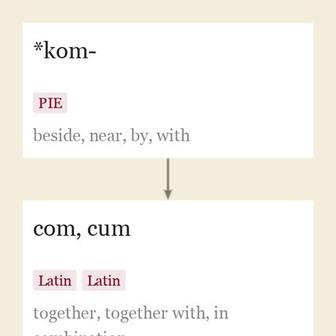| 词源 |
curry v.late 13c., "to rub down a horse," from Anglo-French curreier "to curry-comb a horse," from Old French correier "put in order, prepare, curry," from con-, intensive prefix (see com-), + reier "arrange," from a Germanic source (see ready). Related: Curried; currying. To curry favor "flatter, seek favor by officious show of courtesy or kindness" is an early 16c. folk-etymology alteration of curry favel (c. 1400) from Old French correier fauvel "to be false, hypocritical," literally "to curry the chestnut horse," chestnut horses in medieval French allegories being symbols of cunning and deceit. Compare German den falben (hengst) streichen "to flatter, cajole," literally "to stroke the dun-colored horse." Old French fauvel (later fauveau) "fallow, dun," though the exact color intended in the early uses is vague, is a diminutive of fauve "fawn-colored horse, dark-colored thing, dull," for which see Fauvist. The secondary sense here is entangled with similar-sounding Old French favele "lying, deception," from Latin fabella, diminutive of fabula (see fable (n.)). In Middle English, favel was a common name for a horse, while the identical favel or fauvel (from Old French favele) meant "flattery, insincerity; duplicity, guile, intrigue," and was the name of a character in "Piers Plowman." curry n. a kind of Indian dish or the sauce used upon it, 1590s (as carriel), probably adopted into English via Portuguese caril and its plural caris, and ultimately derived from mingling of various south Indian (Dravidian) words including Middle Kannada, Middle Tamil and Malayalam kari, often indicating something "black in color" or "burnt," and thus applied broadly to spices and meats. In modern Indian cookery, "curry" refers to spice blends with turmeric as their key ingredient; spice blends without turmeric are called masala. Of European dishes spiced after the Indian style, 1747 in British English. As the spice blend used in making the sauce, 1780. Extended to exotic, spicy sauces from outside of India (Thai curry, Indonesian curry, etc.) by 1680s. The verb meaning "flavor with curry" is by 1839. The Murraya koenigii or Bergera koenigii is called curry tree, in English by 1822, probably through one of the south Indian languages. The kari name of the plant comes from the perceived blackness of the leaves (compare the Sanskrit name of the tree, krshnaneembapatram "black neem leaf.") The Middle English term curry, cury, curye, etc. meaning "cookery; culinary art; concoction" (late 14c.) is unrelated to the Dravidian word or its eventual adoption into English. This word is from Old French queverie, "cookery; culinary art," ultimately from Latin coquus "cook." Bot folk a cury may miscuke, that knawledge wantis, And has na colouris for to cover thair awne kindly fautis [William Dunbar, Treatis of the Twa Mariit Women and the Wedo, ca. 1508] updated on September 20, 2022 |
